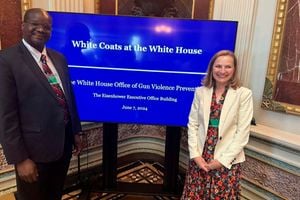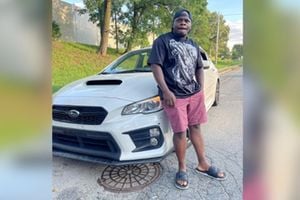
There are rumours that some of the immigrants are being set up by those who know them.
“Lie low like an envelope.” That remark made by late Maasai politician William ole Ntimama could be the best way to describe the current lifestyle of numerous Kenyans and other nationalities who are in the US without proper documentation.
They are hiding. Dreading a knock on the door. Contemplating the possibility of being pushed into an aeroplane and unceremoniously offloaded in Nairobi to restart a life they thought they had got away from — or being shunted into the dreaded Guantanamo Bay.
There are rumours that some of the immigrants are being set up by those who know them. There are also claims that some Kenyan immigrants are looking for ways of getting into “immigrant-friendly” cities like Seattle.
Videos posted online show that there is clear apprehension.
“Ukijua uko ngori, hauna ma-paper, usiambieambie watu. Cheza chini,” said one US-based Kenyan in a widely circulated TikTok video. In other words, he was advising those with immigration issues to keep those matters to themselves, as they do not know who might set them up.
In another controversial video, Ilhan Omar – a US-based congresswoman who was born in Somalia – advises immigrants that if Immigration and Customs Enforcement (ICE) officials question them, they should refuse to talk and say they were advised to do so by their lawyers. This, she says, is because disclosure of one’s name and immigration status is not mandatory.
US President Donald Trump has said repeatedly that illegal immigrants in the US are creating insecurity. During a presidential debate last year, he also accused immigrants of eating pets.
The Migration Policy Institute reports that in 2022, nearly 46.2 million immigrants (legal and otherwise) lived in the US and that these were “the most in US history”.
“That year, immigrants comprised 13.9 per cent of the total US population,” it says.
After being sworn in for his second term, Mr Trump made sweeping changes to immigration policy. The country’s defence department has provided military aircraft for deportations, its border with Mexico has been fortified, and all programmes for immigrants and asylum seekers have been stopped. Swoops and mass deportations have been a daily occurrence.
US government data shows that between October 2020 and September 2024, some 128 Kenyans were deported back to Nairobi. Within the same period, 309 Kenyans were detained over immigration issues, while 205 Kenyans were put under arrest due to immigration queries.
The data shows that the country with the highest number of deportees over that period was Mexico, which had 206,943 people returned to their country. In terms of detention over immigration issues, Mexico again took the cake with 191,532.
So, how do Kenyans end up on the wrong side of the law in terms of immigration status? How can they stay on the safe side?
Mr Hannibal Wanguhu is a Nairobi-based businessman who stayed in the US for 13 years, and some of his businesses target Kenyans in the diaspora — especially in America. He told Lifestyle that the capitalist system in the US encourages settlement without complete documentation so as to offer cheap labour.
“When you go there, the journey to get your papers correct is not easy. If they made it easy, people would get papers and leave whenever they want. But when you don’t have papers, it’s hard to come out. It means you’ll stay there,” argued Mr Wanguhu.
“They will let you into their system so that you can pay taxes, but they’ll not give you full papers so that you can move around (to other countries).”
“All the illegal people are usually employed under the table. They are not in the company’s paperwork,” he added. “Like right now, (a number of) the farms in America are tended to by foreigners. There are Kenyans who work on farms in the Midwest. They are paid in cash; they are not in the system.”
The Pew Research Centre reports that in 2022, some 8.3 million immigrant workers in the US were unauthorised. These were about a quarter of the more than 30 million immigrant workers in the country.

US President Donald Trump signs a document in the Oval Office at the White House in Washington on February 4, 2025.
That situation, he says, explains why some Kenyans go to the US and stay there for years without daring to return home.
“Even the government knows (they are there) but the only thing they’re not going to give you is the paperwork, which makes people just stay there. And that’s why there are people you’ve not seen in 30 or 40 years. Some of them just don’t have papers,” reasoned Mr Wanguhu.
He added that in December 2024, at his club in Lavington that caters for Kenyans returning from the diaspora among other clientele, he hosted someone who was coming back from the US after 27 years.
“There is one who’s coming in March. She’s not been home for 35 years,” he said. “If you ever see a Kenyan (from the US) at home, just know that that person’s paperwork is correct.”
We also spoke with Mr Marvin Opiyo, a Kenyan educationist based in California and who – in 2020 – released a book titled Stuck Here: African Immigrants Tell Their Stories that details the highs and lows of being an immigrant in the US.
Dr Opiyo told Lifestyle that staying under the radar is the current strategy for those with questionable papers.
“Most people with illegal status issues are trying to keep a low profile as they wait and see: stay home, away from places likely to be raided by ICE. Some immigration attorneys have advised people not to open the door when ICE knocks,” said the Maseno School alumnus.
According to Dr Opiyo, immigrants who have committed crimes previously are the most at risk.
“There are isolated cases where some immigrants have committed crimes, and politicians on the far right have made it a battle cry during their campaigns and now they are eager to show that they are delivering on their campaign promises to satisfy the current anti-immigrant sentiments within their base,” said Dr Opiyo.
Mr Wanguhu said that offences such as driving under the influence of drugs (DUI) are treated seriously in the US.
“Unfortunately, a lot of our Kenyans have DUI,” he said.
Asked if the reports of Kenyans snitching on each other are true, Dr Opiyo said: “I have not personally heard of or witnessed such a case, but I have seen similar social media claims.”
Ms Gladys Mogaka is an immigration lawyer who guides Kenyans and other nationalities on US visa applications, green cards, and citizenship, among others.
Asked whether the advisory by Ms Ilhan Omar about not speaking to ICE officials is sound in law, and whether it is okay not to open the door for them, she said it all depends on whether there is a warrant.
“You have the right to remain silent. You do not have to discuss your immigration status with any officer unless they have an arrest or search warrant signed by a judge,” said Ms Mogaka.
“If they have a warrant and they request for your immigration papers, you must show them if you have them. Do not make or sign any statements without your lawyer present. Do not resist arrest. You have a right to speak to a lawyer and a phone call. Calmly request for one. If you are at risk of being deported, find local organisations representing detainees in your local area and save their contacts,” she added.
Arguing against a term that has gained currency in the US, Ms Mogaka said it is improper to describe anyone as an “illegal” as “it is dehumanising and offensive”.

Colombians deported from the United States arrive at El Dorado International Airport in Bogota, Colombia, January 28, 2025.
“What we have are immigrants who have ‘fallen out of legal status, undocumented and/or unauthorised immigrants’ for one reason or another. No human is illegal,” said Ms Mogaka of Gladys Mogaka PLLC that has offices in Nairobi and Dallas.
“If you’re leaving Kenya for the US, the most important thing is to make sure you follow the rules of your visa and stay compliant with immigration laws,” she added.
How to stay compliant
The top tips for staying compliant, she said, include sticking to one’s visa rules.
“Educate yourself on the terms of your visa and be sure you’re using the visa as it’s intended,” she said. “If your visa is about to expire and you want to stay longer, make sure you apply for an extension or change of status before your visa expires.”
“If your visa ends and you haven’t changed your status, it’s crucial to leave the US before your visa expires. Staying longer than you’re allowed can result in serious issues down the line.”
Dr Opiyo noted that Kenyans and other immigrants who go there as students are sometimes forced to go “out of status” because of their financial circumstances.
“Once you’re here, do what it takes to maintain your student, visitor, or whatever immigration status you have. This is usually the greatest challenge for many who come as students. You’re required to take a minimum of so many credit hours, and tuition is high for international students. Relying on money from Kenya or wherever is tough for most people — the exchange rates are not in our favour. Working to pay tuition is tough, especially with the required academic workload. As a result, many people ‘go out of status’ and become ‘stuck here’. Therefore, I’d say, complete your undergraduate studies in Kenya/Africa and go to the US for graduate school,” he said.
Ms Mogaka advised Kenyans never to seek work in the US without the right papers.
“Working without the right authorisation is a big red flag and could hurt your future chances of being in the US legally,” she cautioned.
There is also the reality of Kenyans who marry Americans with the aim of fast-tracking their journey to US citizenship. This, the lawyer said, has its pitfalls.
“Marrying someone for the sole reason of circumventing immigration laws is considered fraudulent by US immigration authorities. There are severe consequences for that, the most severe one being a jail term and deportation. There are so many other legal pathways that one can pursue to get their Green Card,” she cautioned.
The price of getting deported
Immigrants in the crosshairs of the government are spending a pretty penny to defend themselves. The amount can be in millions, Ms Mogaka explained.
“Legal fees vary based on the complexity of the case, the lawyer’s experience, and their location. Lawyers in larger cities generally charge higher fees than those in smaller towns. If your case involves issues like a criminal record or fraud, expect the costs to rise. On average, legal fees can range from $5,000 to $30,000 (Sh646,000 to Sh3.9 million),” she said.
“For some immigrants, deportation can occur quickly, particularly for Mexicans, while for others, the process may take up to 10 years or even more. Depending on the specific circumstances of the deportation, and the relief one is seeking, you may be eligible to continue working if you hold a valid work permit,” added Ms Mogaka, who was a lawyer in Kenya before moving to the US where she obtained her Master’s in law.
In case a person is deported, does that permanently shut the door for their return to the US? Ms Mogaka said it depends on the offence.
“Getting deported doesn’t mean you’ll never be able to return to the US, but it does create some serious hurdles. The amount of time you’re banned from re-entering the US depends on how long you overstayed your visa,” she said.
“If you overstay for more than 180 days but less than a year, you could face a three-year ban. If the overstay is for a year or more, you might be banned for 10 years. A ban does not mean that one cannot come back. Even though it may be complicated, there are waivers available or return to the US for something like attending a conference,” added Ms Mogaka.
Mr Wanguhu and Dr Opiyo disabused the notion that it is always an enviable good life in the US.
“Do not think that it is a bed of roses with ‘dollars growing on a tree’, as the saying goes. And that’s not to say it’s all bad; it has some advantages. But as the saying in Dholuo goes, ogwang’ chamo to thoo rome (the wild cat eats but has to endure the dew),”said Dr Opiyo.
“As Malcolm X said, ‘If you see someone succeeding where you are not, know that there is something they are doing that you are not doing’… The bottom line is that it is hard work with little sleep. But others have done it, and so can you — if willing to do what it takes,” he added.
Said Mr Wanguhu: “Life here (Kenya) is 10 times better than out there. The only thing is that it may not have as much cash flow, but in life in general (is better) in Kenya.”
“People don’t understand that part: there’s no life (in the US). You wake up, you go to work, you come back home and you repeat over and over again. When you want to find some social life, you have to organise. It just doesn’t happen.”
“There are people who sleep even two or three or four hours a day because they are working. Because of the credit system there, you acquire so much debt and so you have to keep working because you’re always paying. They give you a credit card, you start purchasing. It means the economy is moving. That’s how the American economy is built — on debt. Everything is borrowed. It means there is consumption, and the economy is big because people are not sweating at the beginning. They sweat to pay, but to consume they use the card,” Mr Wanguhu further noted.
“If you’re good at paying credit, they reward you; your credit scores go high. I used to sell cars there. I used to have people who could walk in with just their ID and leave with a car.”
In Mr Wanguhu’s thinking, some US-based Kenyans shy away from returning home because they fear being judged harshly.
“I want our diaspora out there not to fear. A lot of them are scared about home. You know what they’re scared of? Expectations. They know people know they are abroad, so they should be successful. But, honestly, most people abroad are actually not successful. They are all just living like us, struggling like us,” said Mr Wanguhu, who is into real estate, farming, events, photography, among other businesses.
As the hunt for “illegals” goes on, a question lingers: Might a flight full of handcuffed Kenyans be landing at the Jomo Kenyatta International Airport soon, as has been witnessed in other countries’ airports?











